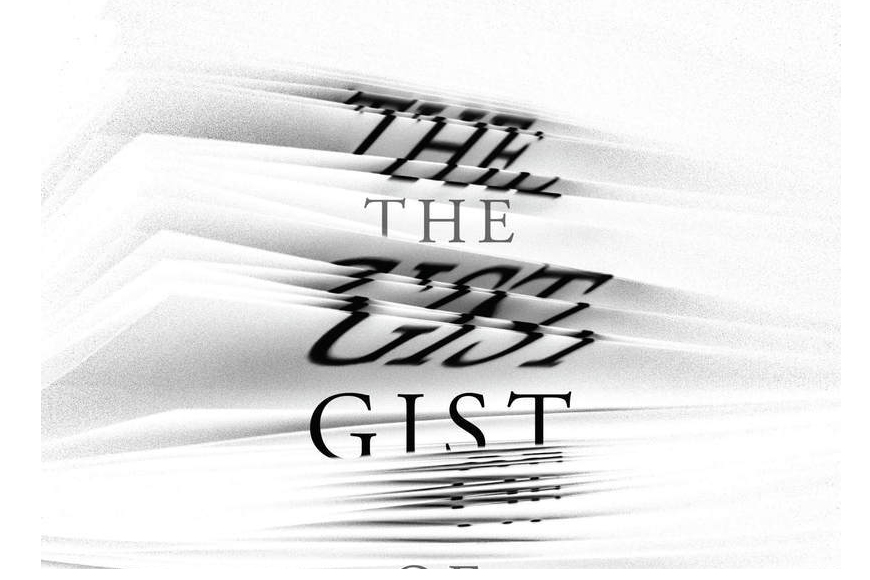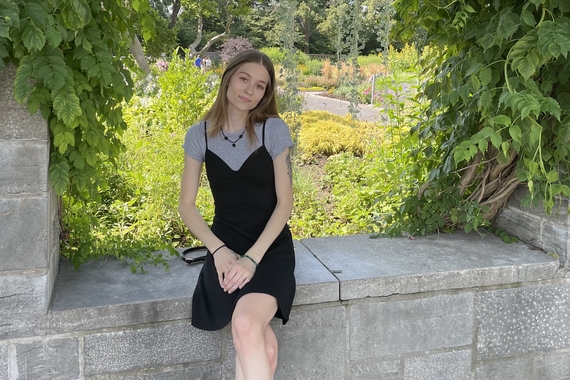New Pages Summer 2018
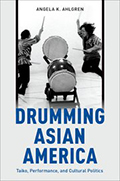
Update your TBR pile with abundant titles from fiction, poetry, and nonfiction, including a rich harvest of chapbooks. What is a chapbook? A collection of writing, usually poetry or fiction, of under 40 pages (with roots in the 16th century!).
Angela Kristine Ahlgren (MA 2005)
Drumming Asian America: Taiko, Performance, and Cultural Politics
Oxford University Press
From the publisher: "With its dynamic choreographies and booming drumbeats, taiko has gained worldwide popularity since its emergence in 1950s Japan. Harnessed by Japanese Americans in the late 1960s, taiko's sonic largesse and buoyant energy challenged stereotypical images of Asians in America as either model minorities or sinister foreigners. . . . Using ethnographic and historical approaches, combined with in-depth performance description and analysis, this book explores the connections between taiko and Asian American cultural politics. Based on original and archival interviews, as well as the author's extensive experience as a taiko player, this book highlights the Midwest as a site for Asian American cultural production and makes embodied experience central to inquiries about identity, including race, gender, and sexuality."
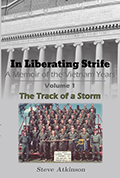
Steve Atkinson (MA 1972)
In Liberating Strife: A Memoir of the Vietnam Years, Volumes 1 and 2
Self-published
From the publisher: "Vietnam: A word that few Americans had ever heard before the early 1960s, and a place that even fewer would have been able to point out on a map, slowly but inexorably becomes the primary focus of national attention as America’s intervention in the war ultimately emerges as the defining event of the Baby Boomer generation. After struggling through a crisis of conscience and experiencing the joys of an unexpected first love, the author finds himself separated from his new fiancé and shipping out to the war zone as a soldier. His assignments 'behind the lines' in the war zone sometimes seem calm by comparison with [the US'] domestic turbulence as he enjoys friendships with Army buddies closer than any he has ever experienced. Eventually the US intervention in Cambodia and the shootings at Kent State bring the war at home to a bloody climax. . . . The two young lovers cling to the hope of their own reunion and better days ahead eventually for their troubled nation. Their dreams of beginning a life together are finally realized, but not before personal tragedy teaches them the fragility of life in a way they never would have anticipated."
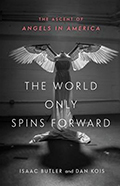
Isaac Butler (MFA 2013), co-author
The World Only Spins Forward: The Ascent of Angels in America
Bloomsbury USA
From The Washington Post: "A full-bodied portrait of Angels in America and the many people who nurtured it emerges from [this] vivid, intelligently organized oral history by writer/director Isaac Butler and journalist Dan Kois. The co-authors avoid a common pitfall of oral history—reprinting gossip that is neither fact-checked nor challenged—by scrupulously including various points of view on such contentious subjects as the recasting of parts as the play moved toward Broadway. [T]he hundreds of interviews they conducted in 2016-17 . . . are fleshed out with judicious excerpts from contemporary press coverage and a journal kept by an actor in the original workshop, as well as some marvelously evocative photos. . . . Without in any way diminishing the exceptional quality of Kushner’s singular vision, Kois and Butler remind us that Angels in America was the result of a collective creative process."
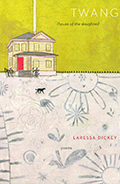
Laressa Dickey (MFA 2005)
Twang (house of the daughter) [poetry]
Backwaters Press
From author Josei Sigler Sibara: "By turns gritty and lush, Laressa Dickey’s Twang destroys any notion of precise opposites to show us how the animacy of existence renders everything altered by everything else. Subject and object are at times beautifully obscured so that the acted-upon becomes the actor. Once you think you’ve got ahold of an image, expect a surprise—Twang takes what feels like it could belong to you, could fit in the palm of your hand, and explodes it, makes it too enormous to hold. In this way, you feel held, instead, even as you also tumble and plunge deeper in the service of more knowing. You may start in the ephemeral and find yourself in the colloquial. Lightning may crumble and dogs may bark with their fists. While Dickey paints a stunning portrait of a southern family subsisting on tobacco, she also insists on cutting that painting into strings and building an instrument on which to play her insistent, shocking song—a melody for the harmony of the man who invented Twang. It’s a honey-coated howl."
Professor and Chair Andrew Elfenbein
The Gist of Reading
Stanford University Press
From Pomona College President G. Gabrielle Starr: "Deftly combining research from cognitive psychology with historical insight and careful literary criticism, Andrew Elfenbein convincingly argues that everyday reading practices are more complex than most literary scholars have imagined and that literary reading is not particularly a special case of reading practices. The Gist of Reading promises to help set a new standard for integrative scholarship." Read Professor Elfenbein on "How We Read."
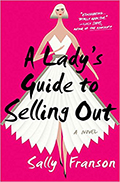
Sally Franson (MFA 2013)
A Lady's Guide to Selling Out [fiction]
The Dial Press
From Kirkus Reviews: "Casey is a thoroughly millennial 28-year-old, living in a Minneapolis that has its own Real Housewives franchise and working at an upscale ad agency. She’s such a fast-rising star at work that she delays pursuing her dream: finding a televised outlet for her wit and enthusiasm (which drive the biting narration along with raw insight into her own insecurities). At the moment, she's in a moral bind, pulled between loyalty to her leftist best friend, an aspiring novelist, and a new opportunity at her job selling authors to corporations for a profit. . . . Casey believes she can weather this rain shower and gain the upper hand, but one lesson of this topical book is that women are not easily—or ever—granted the upper hand, no matter how plucky or right they are. Come for the hilarious narration, stay for the whirlwind plot, luxuriate in the satirical gleam."
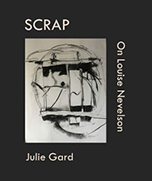
Julie Gard (MFA 2000)
Scrap: On Louise Nevelson [poetry]
Ravenna Press Pocket Book Series
From author Kathleen McGookey: "Just as Louise Nevelson organized the chaos of found objects—bowling pins, winged griffins, tennis rackets, and wooden wheels—into mini-worlds contained in uniform boxes, Julie Gard's spare yet expansive prose poems frame one major question. How can a woman be both an artist (or writer) and a mother? Children and art, Gard writes, demand the same force and breath. Scrap explores two possible, nuanced answers. In Gard's vision of Nevelson's kitchen, the artist created dark realizations and potions of grass and rust and horns—never food or warmth—and sent her young son away for years. Yet Gard, in considering Nevelson's art and life, constructs another way: between and despite daily interruptions and worry, forgotten swimsuits and repacked suitcases, she both cares for her daughter and writes deeply resonant prose poems, elegant in their clarity."
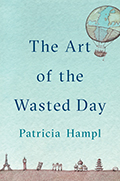
Regents Professor Patricia Hampl
The Art of the Wasted Day
Viking
From NPR: "Imagine a book that celebrates daydreaming, that sees it not as a moral failing, but as an activity to be valued as an end in itself. Hampl is intrigued by the kind of instinctual, floaty, aimless daydreaming that many of us—if we were lucky—indulged in for hours and hours as children. As adults, of course, we feel like we need to have something to show for our time: achievements, chores, to-do list items crossed off. Hampl wonders about what we miss when we no longer allow ourselves to simply get lost in thought. Her sharp and unconventional book—a swirl of memoir, travelogue and biography of some of history's champion day-dreamers—is its very own Exhibit A, making the case for the profound value of letting the mind wander. . . . Like most of the rest of this odd and haunting book, it's impossible to do justice to the cumulative power of Hampl's dream-weaver writing style by just quoting a few lines. You have to go on the whole voyage with her." Read interviews and reviews.
Professor Ray Gonzalez
Some Holy Ghost [poetry chapbook]
Mesilla Press
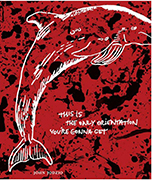
John Jodzio (BA 1999)
This Is the Only Orientation You're Gonna Get [fiction chapbook]
QuarterlyWest
Winner of Quarterly West's 2017 Chapbook Contest. From City Pages: "The 18 flash fiction missives contained therein bear blunt titles like, 'Most of You Know Me from Losing My Virginity to the Ben Franklin Impersonator' and 'Last Summer I Had Sex with a Hair Stylist Named Lori Once or Twice a Week.' But if you think Jodzio gives it all away upfront, you’re wrong. In 'The Two Men,' a waitress makes out with a cover band musician and a butcher, then pits them against each other to rid herself of a bad dream involving suspendered men fighting in the rain. . . . Jodzio’s stories aren't exclusively shock-jock material; just when you start to suspect he’s a BS artist writing his way through a tried-and-true formula (strange person meets stranger person, then something whacked happens), he’ll drop a truth bomb of human emotion. In a story about a county pie contest, contestant #2 'tells them her secret ingredient is love, even though she knows love tastes like salt.'"
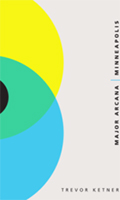
Trevor Ketner (MFA 2016)
Major Arcana: Minneapolis [poetry chapbook]
Burnside Review
Winner of the 2017 Burnside Review Chapbook Contest. From judge Diane Seuss: "It is rare to find a sequence of poems as intimate, empathic, and attentively-shaped. . . . The tarot's major arcana provides a columnar foundation and a path of transformation, shadow-selves, gods and archetypes. They are echoed in characters who populate the speaker's Minneapolis neighborhood, the 'millennial glow of iPhones cooling the mint walls,' like the High Priestess, a woman who wears 'a cap with a moon stitched in,' who must remember to 'shave / to keep her five-o-clock shadow from coming in,' on the joyful verge of beginning her estrogen injections. God hides here too, in the closet where a black velvet dress hangs, God, 'genderqueer, or I hope They are.' For all of its nuances and shadows, the book journeys toward a hard-won, intelligent, intimate delight, where giving the lover their injections helps to 'balance the body with what dwells within the body' and where the world has so much potential for joy 'that it dwells in us / like a light left on accidentally coming / back from a night out.'"
Janna Knittel (MFA 2016)
Fish & Wild Life [poetry chapbook]
Finishing Line Press
From author Gerald Vizenor: "Janna Knittel creates irresistible images from the heart of feathers, fins, and furs. She waits with a crow in a cage of reindeer bones, runs with the bright skin of fish, and worries about the overnight march of bears. These poems praise the bloodlines of natural mercy.”
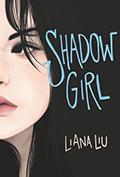
Liana Liu (MFA 2011)
Shadow Girl [young adult fiction]
HarperTeen
From School Library Journal: "Recent high school graduate Mei has accepted a job as an academic tutor to the youngest child of a finance mogul. When she reaches the island where the Morison family summer home is located, Mei is stunned at the lifestyle differences between her own family and that of her new charge. The teen tries to focus on her obligations, but as she spends more time with the Morisons, she finds herself devoting less energy to lesson plans, struggling to navigate the overindulgence and complicated web of friction in the home instead. And as Mei is increasingly pulled into the Morison family drama, strange things start to occur in the house. Mei isn't superstitious, but she can't shake her growing unease. Although presented as a ghost story, the first two-thirds of the book focus more on Mei's struggle to find and assert herself amid the strained Morison family dynamics. . . . When the soft noises and shadows in her bedroom on the island eventually do twist into something more sinister, it's more foretelling than frightening."
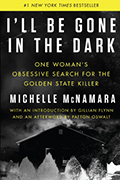
Michelle McNamara (MFA 1997)
I'll Be Gone in the Dark: One Woman's Obsessive Search for the Golden State Killer
Harper Collins
From The Los Angeles Times: "In I'll Be Gone in the Dark, the book she was working on when she died, McNamara was smart enough to recognize her own obsession and make it part of the story she tells. At its center is the criminal who terrified Californians in the 1970s and '80s [who was arrested in April]. The book is much more than a whodunit; McNamara's point of view expands to include his victims, their loved ones, the police who tried to catch him, the amateur sleuths who gather online to share clues and the communities in which he plied his violent trade. What makes McNamara's work so compelling is her empathy and sensitivity toward the people touched by these crimes. . . . The book's final chapter is a behind-the-scenes look at some of the data-driven sleuthing McNamara was pursuing. The prose here can't match McNamara's (I wish I could read the next 10 books she would have written)."
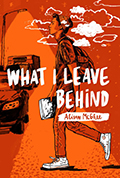
Alison McGhee (MA 1992)
What I Leave Behind [young adult fiction]
Caitlyn Dlouhy
From Publishers Weekly: "In this spare, emotionally raw novella, the deeply thoughtful 16-year-old narrator, Will, vainly tries to recreate his father’s cornbread recipe, and he walks through LA neighborhoods while his mom works overnight at the hospital. In finely honed chapters, each introduced by a Chinese character, McGhee (Never Coming Back) crafts a slim cast of strongly sketched individuals, including Will’s socially awkward boss at the Dollar Only store, his childhood friend Playa, and Mrs. Lin, who operates a Chinese blessings store. The narrative gradually reveals the troubles Will seeks to walk off. 'Sometimes the right route is the route not past other places, places you maybe love but can't walk by right now. Like Playa's house. Like the blessings store. Like the river bridge over Fourth Street.' McGhee skillfully evokes sense memory, as Will attempts to find solace in his nighttime wanderings. Ultimately, the piercing narrative offers an affirmation of remaining connected to others through loss as Will embraces his relationships and begins to heal."
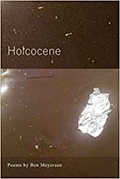
Ben Meyerson (MFA candidate)
Holcocene [poetry chapbook]
Kelsay Books/Aldrich Press
From author A. F. Moritz: "Ben Meyerson's Holcocene makes something beautiful and penetrating out of the genre of the post-human apocalypse, the wasteland domain of intelligent machines. The Greek of his title signifies a new era peopled by robots seeking the sea, as they seem compelled to do by programmed hints installed in them by their now-vanished human creators. As Meyerson's lost machines muse, grieve, wonder, and seek to grasp their vanished maker, an elegy emerges that is perhaps a prophecy: 'once we have learned the lambent scar / of what is human, I / will bear it up, then // take you and comfort you.' As in Karel Capek's R.U.R., at the end of the human experiment of self-travesty and destruction, the I and the Thou and love have re-emerged, or persisted. These machines mysteriously become our voices, in which we survive beyond our errors. In them, despite our delusion that we are mechanisms, we live as song: the lovely, thoughtful, sorrowing, bewildered, courageous song that Meyerson creates in Holcocene."
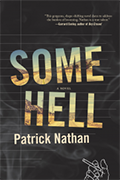
Patrick Nathan (BA 2007)
Some Hell [fiction]
Graywolf Press
From The New York Times: "For the first 25 pages, Patrick Nathan’s debut novel, Some Hell, poses as a conventional coming-of-age tale set in the American suburbs about a young boy struggling with his sexuality. Then it peels that mask off like a replicant to reveal the more sinister creature underneath. We begin with Colin, the protagonist, a few days shy of his 13th birthday, on an afternoon when his older sister, Heather, ominously predicts he will die in three years. . . . When their father dies two days later, shooting himself in the head in an apparent suicide, it is clear that even if Heather were really able to tell the future, such warnings were never meant to help anyone. . . . The result is a very different literary thriller, one in which the mystery is not who killed the victim, but how those who kill might live with what they’ve done. And as mother and son head off to their own separate apocalypses, made from their very different complicities, Some Hell becomes a canny and terrifying moral fable about our new and old American ways of both being together and missing each other."
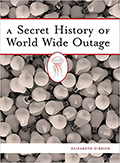
Elizabeth O'Brien (MFA 2015)
A Secret History of World Wide Outage [poetry chapbook]
Diode Editions
From the publisher: "TO WHOM IT CONCERNS, RE: World Wide Outage In addition to the cover letter, enclosed please find the following materials. 1. Assets including but not limited to lakes, oceans, rivers, puddles, girls, and other assorted bodies of water, as well as a fine collection of second-hand clothes and tarnished costume jewelry (note: all assets are guaranteed to be in usable condition, if a little wet). 2. Liabilities including but not limited to insufficient funds, malfunctioning equipment, flood damage, and missing data. 3. Fifteen new poems by Elizabeth O'Brien investigating the value of vulnerability and the nature of inevitability in a gorgeous, irrepressible world on the verge of collapse."
Sheila O'Connor (BA 1982)
Until Tomorrow, Mr. Marsworth [children's fiction]
Putnam
From The Star Tribune: "Sheila O’Connor’s latest middle-grade novel had me at Page 1. I’m a sucker for unlikely friendship stories, and this one is beautifully rendered through letters between an intrepid 11-year-old and an elderly pacifist. Reenie and her two brothers are new to town, staying with their grandmother while their father works to pay off the hospital bills that have bankrupted them. Their mother has died, and Reenie needs money (thus the paper route), but she also needs a friend (thus her continued correspondence with Mr. Marsworth). But what makes Reenie a most fetching narrator (beyond her letter-writing ability) is her soft spot for underdogs and her loyalty to her brother, Billy, recently 18 and in danger of being drafted to Vietnam. . . . This is a significant historical tale about war, bullies, peace, friendship and family."
Scott Parker (MFA 2014)
Conversations with Joan Didion
University Press of Mississippi
From the publisher: "Conversations with Joan Didion features seventeen interviews with the author spanning decades, continents, and genres. Didion reflects on her childhood in Sacramento; her time at Berkeley (both as a student and later as a visiting professor), New York, and Hollywood; her marriage to Dunne; and of course her writing. Didion describes her methods of writing, the ways in which the various genres she has worked in inform one another, and the concerns that have motivated her to write."
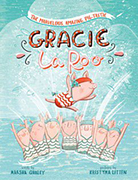
Marsha Qualey (MFA 2008)
The Marvelous, Amazing, Pig-Tastic Gracie LaRoo! [children's chapter book]
Picture Window Books
From Kirkus Reviews: "Meet Gracie LaRoo, a sweet swine who loves to swim. In the first of this collection of four pig tales, young Gracie suffers performance anxiety at the Pig Jubilee, a synchronized-swimming contest. She doesn’t want to let her slightly older teammates down, but this is her first competition. When her purple spangly bag (with all her swimming gear) goes missing, Gracie is even more distracted. She perseveres (finding the bag) and gains the confidence to help her team win. Next, thanks to her swimming skills, she’s asked to be in a Hog Heaven Studios picture with famed actress Tilda Swinetune. Gracie is anxious again, but her creativity solves a problem on the set, and movie magic ensues. . . . Qualey’s easily read, short tales exude girl power. Litten’s colored-pencil illustrations grace nearly every page and match the text in tone and energy."
Anna Reckin (MFA 1998)
Line to Curve [poetry]
Shearsman Books
From author Moniza Alvi: "Rather like an intricate and ever-surprising fabric, pulled looser and then tautened, this is poetry of rich and exceptional poise. Phrases, words, even letters are given the space to breathe and resonate. Anna Reckin's work refers to transposing, playing, gathering and carving; remarkably the poems themselves accomplish all such gestures in their dialogue with the materiality of the world. Highly recommended."
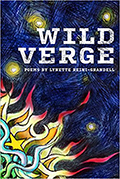
Lynette Reini-Grandell (PhD 1992)
Wild Verge [poetry]
Holy Cow! Press
From Kirkus Reviews: "Reini-Grandell (Approaching the Gate) searches for moments of transformation in this poetry collection. 'For Your Information,' a late poem in this book, begins, 'Today I found / your discarded banana peel / in the basement / on top of the dryer / removable lint trap / and realized // I must incite disorder.' Such instantaneous shifts from calm to chaos are common in this collection, which bears witness to life’s terrible, beautiful ability to collapse, explode, and refashion itself. There are persona poems that have the feel of folklore [that sit] alongside more contemporary poems, such as 'A Supermarket in Minnesota,' in which the speaker’s transgender partner is confronted by a religious woman in a grocery store. Mystical, incantatory pieces like 'Geomancer' and 'I Am a Bear' set a delightfully witchy tone, while more grounded narrative works evoke the greatest emotional responses. 'Every Astonishing Day of My Life' is a brilliant slideshow in 11 stanzas, which ends with this reflective ars poetica: 'I still sit at the table. I still leave / out significant parts of my story, my sins. / I still marry my strange familiar / every astonishing day of my life.' A singeing collection of surprises and epiphanies."
Professor Emeritus Marty Roth
Change Partners: Motion, Becoming, Difference, Violence
Academica Press
From the publisher: "Change Partners will give an educated reader a deep understanding of a particular conceptual 'village' . . . as a book about change it is also a book about motion, becoming, and difference, because all of these concepts circulate around the same patches of meanings. The titles of the first three chapters are self-explanatory as the three main inflections of the title: motion (mobility, mobility studies, the pleasures of walking), becoming (contingency, the clinamen, the new), and difference (dialectic and binary structure and the rejection of Hegel). The fourth chapter, 'Life,' pretends to investigate growth but spends most of its time with agency. 'Time' looks at historical and social change, and the last chapter addresses the violence of change (revolution, speed, shock). An apposite description for this work might come from John Partridge's Treasure of Commodious Conceits of 1573 as he speaks of collecting knowledge that had previously been cloistered, converting coterie texts into things 'meete and necessarie for the profitable use of all estates.'"
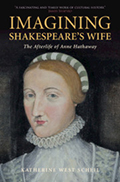
Professor Katherine Scheil
Imagining Shakespeare's Wife: The Afterlife of Anne Hathaway
Cambridge University Press
From the publisher: "What has been the appeal of Anne Hathaway, both globally and temporally, over the past four hundred years? Why does she continue to be reinterpreted and reshaped? Imagining Shakespeare's Wife examines representations of Hathaway, from the earliest depictions and details in the eighteenth century, to contemporary portrayals in theatre, biographies, and novels. Residing in the nexus between Shakespeare's life and works, Hathaway has been constructed to explain the women in the plays but also composed from the material in the plays. Presenting the very first cultural history of Hathaway, Katherine Scheil offers a richly original study that uncovers how the material circumstances of history affect the later reconstruction of lives."
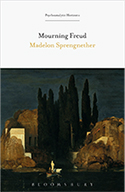
Regents Professor Emerita Madelon Sprengnether
Mourning Freud
Bloomsbury
From Columbia University professor Joel Whitebook: "Madelon Sprengnether's The Spectral Mother was one of the essential texts to grow out of the fruitful intersection of feminism, literary theory, and psychoanalysis. In this collection of essays, Mourning Freud, she has made another important contribution to the psychoanalytic theory of culture. Sprengnether is to be congratulated for deploying her mastery of the pre-Oedipal turn in psychoanalysis, trauma theory, Freud studies, and neuropsychology to properly mourn Freud—to transform him from 'a ghost into an ancestor.' In so doing, she has not only advanced psychoanalytic discourse beyond the infantile polemics of the Freud Wars, but also helped us to form a more mature picture of the first psychoanalyst as well as of ourselves." Read an interview.
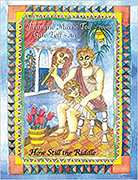
Francine Marie Tolf (MFA 2006)
How Still the Riddle [poetry]
Pinyon Publishing
From the publisher: "Francine Tolf began writing poems when she was 20—at first rhyming poems, fledgling sonnets and ballads, and later through several decades developed her craft in various forms without losing her love and gift for rhythm, sound, and music: 'My golden hair is turning gray, / my sins are sinned, my wild oats flung. / Now’s the time to pen a book / of rhymes for children old and young.' The importance and appeal of nature, relationships, language, and the mysteries of our intricate connections with each other recur in these poems . . . [which] are comforting while mindful of the uncertainties that challenge our lives: 'There is no one to cry my secret to. / A deaf wind whispers, Even if there were, / your lover could not share it if he knew.' Francine's late sister, Gale Tolf, created the beautiful ink and watercolor drawings. Gale found inspiration in myth, legend, and fairytale, a perfect complement to these thoughtful, loving, and life-fulfilling poems."
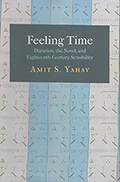
Assistant Professor Amit Yahav
Feeling Time: Duration, the Novel, and Eighteenth-Century Sensibility
University of Pennsylvania Press
Harvard Professor Deidre Lynch: "In this innovative and ambitious book, Amit S. Yahav challenges some overly entrenched critical commonplaces about the Enlightenment roots of modernity while simultaneously elaborating new and compelling analyses of novels and aesthetic treatises that are the well-established mainstays of eighteenth-century literary studies." Read our interview and an excerpt.
